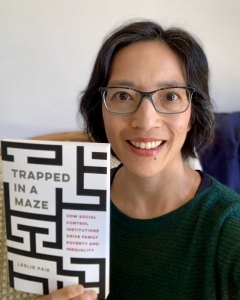October is National Book Month, a time to appreciate the joys of reading and writing. In the words of Stephen King, "Books are a uniquely portable magic."
The T. Denny Sanford School of Social and Family Dynamics at Arizona State University is home to avid bookworms and faculty authors. From fantasy fiction to real-world case studies and textbooks, read below to discover a few recommended favorites and faculty-written works.
Recommended books:
“The House in the Cerulean Sea,” by T.J. Klune

Kimberly Jensen
Recommended by Kimberly Jensen, lecturer in family and human development and sociology
A fantasy novel delicately written for the modern world, “The House in the Cerulean Sea” is a comforting, witty novel that explores the meaning of family, love and letting go of judgments.
Lecturer Kimberly Jensen shares a few words about why it’s her all-time favorite novel:
“It's about a caseworker who is assigned to go to a place where kids with magical powers live. And he goes there with a lot of different biases, I think, and assumptions about the kind of children he's going to meet. But through the book and throughout the time that he grows in relationships, he draws a lot of connections. And so the book is a lot about being welcoming, about accepting others, about loving others. And in the end, it's actually really neat to see how he was thinking he was going to be there to help these children, but they may in fact help him and grow his heart many, many times bigger. And he ends up finding a family actually when he goes there.
"It's a really fun, heartwarming book. It helps with imagination, and it's definitely something that I recommend to students and … a way that we can apply what we're learning about people and relationships.”
“Violeta,” by Isabel Allende

M. Brougham
Recommended by M. Brougham, course instructor for the Working with Military Families certificate and family and human development
Isabel Allende’s book is the story of a century — quite literally. Violeta Del Valle, the fictional main character, is a 100-year-old woman born in the Spanish flu era. The novel tells an autobiographical account of her upbringing and the experiences she went through in the context of historical events. From women’s rights to modern technology, she witnessed some of society's biggest changes between the Spanish flu and COVID-19 pandemic.
Allende tells a tale that's mesmerizing, heartfelt and colorful, with a little humor sprinkled here and there. Instructor and book-lover M. Brougham talks about why this book is one of her favorites:
“It was amazing. It was a little slow starting, but then it so gripped me, I couldn't put it down. I read it in a day and a half.”
“The Giver,” by Lois Lowry

Jon McQueen
Recommended by Jon McQueen, instructor of sociology
“The Giver” is a classic young-adult dystopian novel and required reading in many schools. Through the eyes of the inquisitive main character, Jonas, Lois Lowry explores the dangers of being the same as everyone else. By being perceptive and open to new experiences, Jonas discovers the unsettling secrets of the society he lives in. The more he knows, the more he wants to know.
Though this book is geared toward young adults, its layers and meanings are equally meaningful for mature audiences. Readers interested in deeper analysis can explore themes related to the meaning of color, the function of memory, mechanisms of religion and the dangers of eugenics.
Instructor Jon McQueen shares what makes this book special to him: “I've always enjoyed it because it really plays as a sociologist to what happens if we do not have deviance or we don't have things that challenge the norms. It becomes antiquated, it becomes people following and conforming to everything. So I enjoy 'The Giver' because it allows us to challenge these ideas.”
Faculty-written books:
“Trapped in a Maze: How Social Control Institutions Drive Family Poverty and Inequality,” by Leslie Paik

Leslie Paik
Leslie Paik, sociology professor, earned the 2022 William J. Goode Book Award for her work.
To armchair experts, poverty might seem like a simple problem to solve: just give people money, right? But those who try to get help know how complicated it can be. “Trapped in a Maze: How Social Control Institutions Drive Family Poverty and Inequality” opens with an account of the Hernandez family, a multi-generational household of seven sharing a small New York City apartment. Paik chronicles the messy processes the family has to work through to get help, from misinformed medical administrators to complicated paperwork.
Backed by demographic and case data from her research, Paik makes the point that if social institutions are to help people, they need to restructure their processes so they are easier to navigate.
Paik says, “I hope that readers come away with a greater understanding of poor families’ herculean efforts to provide for their children and of the expected and unexpected ways that institutions often keep them from moving forward.”
“Introduction to Family Processes: Diverse Families, Common Ties,” by Denise Ann Bodman, Bethany Bustamante Van Vleet and Randal D. Day

Denise Bodman and Bethany Van Vleet
Denise Ann Bodman is a principal lecturer in family and human development and her daughter Bethany Bustamante Van Vleet is a senior lecturer in family and human development.
Those interested in family and human development will enjoy the insights provided by this book and its authors. “Introduction to Family Processes: Diverse Families, Common Ties” serves to provide an explanation of the complex workings of inner family life. The text primarily focuses on family processes and dynamics (the "inside" of families) as opposed to sociological trends, political topics or the individual psychological approach. The text further presents the research underlying these processes and effectively presents ways to increase the positive aspects of family life.
Denise Bodman expressed why this book was such a joy to write, saying, “It was a labor of love ... working with my daughter on a topic I love and bringing to life a textbook that meant so much to Randy Day (my mentor who passed, along with his wife).”
“Bayesian Psychometric Modeling,” by Roy Levy and Robert J. Mislevy

Roy Levy
Roy Levy is a professor specializing in measurement and statistical analysis.
This book is for those students who enjoy learning about probability and statistics. “Bayesian Psychometric Modeling” presents a unified Bayesian approach across traditionally separate families of psychometric models. It shows that Bayesian techniques, as alternatives to conventional approaches, offer distinct and profound advantages in achieving many goals of psychometrics. Adopting a Bayesian approach can aid in unifying seemingly disparate — and sometimes conflicting — ideas and activities in psychometrics. This book explains both how to perform psychometrics using Bayesian methods and why many of the activities in psychometrics align with Bayesian thinking.
Professor Roy Levy says, “The book was a terrific learning experience for me, and an opportunity to have a number of ideas I had been discussing with my co-author coalesce into a coherent account.”
More Arts, humanities and education

ASU professor's project helps students learn complex topics
One of Arizona State University’s top professors is using her signature research project to improve how college students learn science, technology, engineering, math and medicine.Micki Chi, who is a…

Award-winning playwright shares her scriptwriting process with ASU students
Actions speak louder than words. That’s why award-winning playwright Y York is workshopping her latest play, "Becoming Awesome," with actors at Arizona State University this week. “I want…

Exceeding great expectations in downtown Mesa
Anyone visiting downtown Mesa over the past couple of years has a lot to rave about: The bevy of restaurants, unique local shops, entertainment venues and inviting spaces that beg for attention from…


